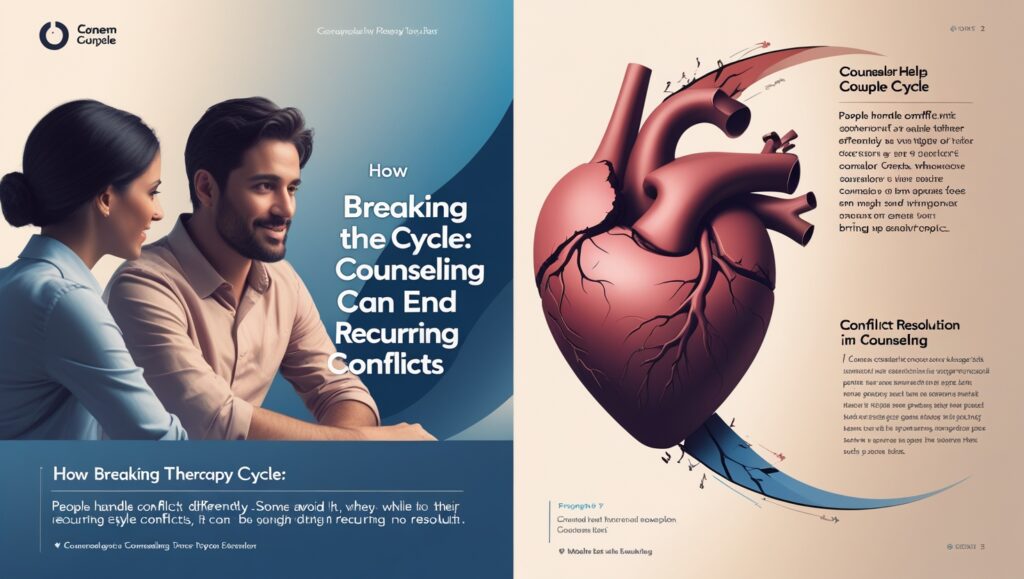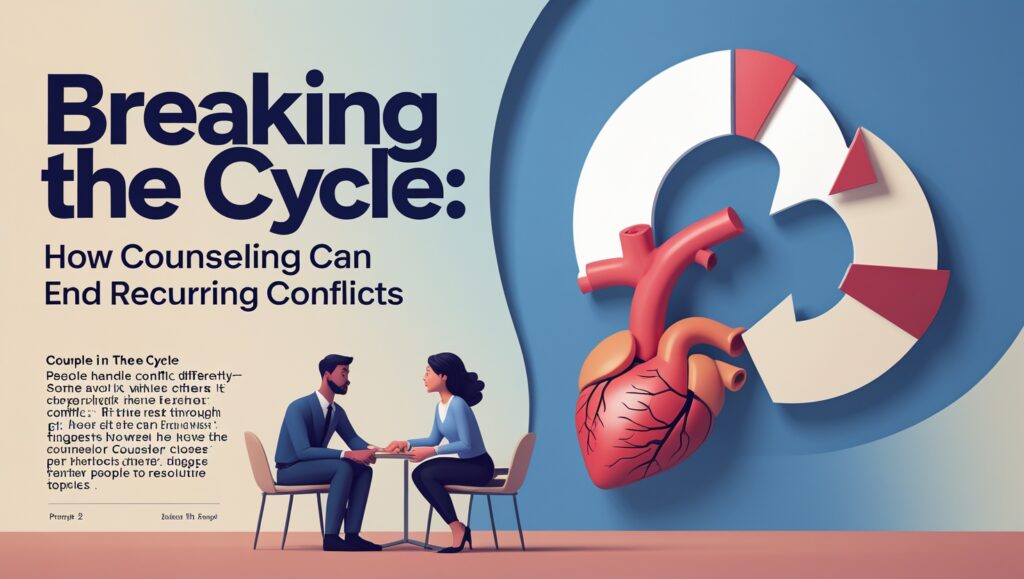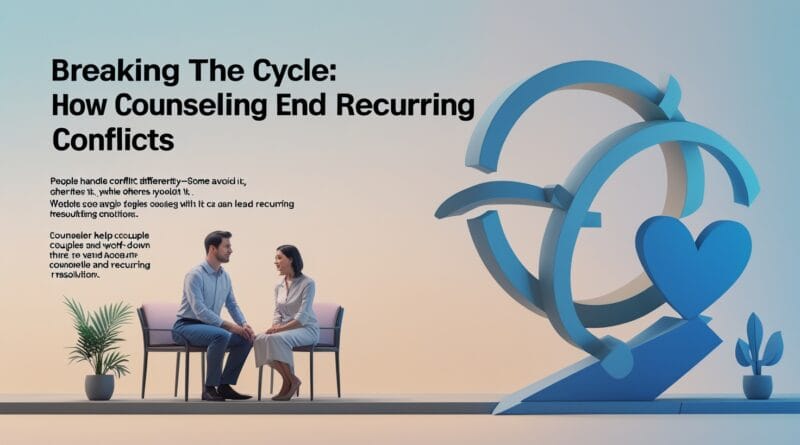Breaking the Cycle: How Counseling Can End Recurring Conflicts
When you find yourself in this same argument over and over again, it’s so easy to feel hopeless about your relationship. Why do these conflicts keep coming back? And how can you resolve them once and for all? The answer usually lies in understanding deeper patterns of communication-a process that counseling may uncover and address.
Whether one is living with married life, has just started married life, or whether one is a mental health advocate needing advice, this guide will explain how counseling can help break the cycle of repetitive conflicts. Also discussed are very common frequently asked questions about relationship counseling to bring clarity and direction.
Nature of Repetitive Conflicts in Relationships
Before we dive into solutions, it’s essential to understand why repetitive conflicts arise in the first place. These patterns generally arise from the following aspects:
1.Unresolved Issues
Old wounds and unresolved feelings may resurface through recurring tensions. For instance, resentment from past disagreements may inadvertently fuel present conflicts.
2.Communication Gaps
Miscommunication or lack of effective communication creates misunderstandings. One partner might feel unheard while the other feels overwhelmed, thus igniting repetitive arguments.
3.Different Conflict Styles
People handle conflict differently—some avoid it, while others confront it. When those styles clash, it can lead to recurring frustration and no resolution.
4.Underlying Emotional Triggers
Some conflicts are rooted in emotions such as fear, insecurity, or unmet expectations. Without identifying these triggers, cycles repeat themselves.
If any of these sound familiar, you’re far from alone. These are typical challenges in relationships, and counseling is designed to address them effectively.

Why Counseling Works to Break the Cycles of Repetitive Conflict
Professional counseling digs deeper to tackle what lies beneath an argument. How does it happen?
- Identify Root Causes
Counselors are trained in finding the causes that give rise to conflicts. Of course, is the issue with the dishes being left in the sink, or is it really much more than this, reflecting frustration in areas of household responsibility? Dig a little deeper, and the real issues become understandable.
- Skill Building in Communications
One of the most common focuses in counseling is helping couples develop healthier communication patterns. This includes learning how to:
- Express feelings without blaming
- Actively listen to understand, not just respond
- Recognize nonverbal cues in conversations
- Building Emotional Awareness
Counselors help couples identify and work through their emotional triggers. For example, if one partner closes down whenever he feels criticized, a counselor might teach both spouses how to bring up sensitive topics.
- Formulating Actionable Strategies
Counseling is not just about theory; it involves actionable strategies for solving future conflicts by establishing boundaries, showing empathy, and compromising.
In this process, through breaking these cycles, couples can start rebuilding trust, mutual understanding, and connection.
Frequently Asked Questions About Counseling for Relationship Conflicts
The idea of relationship counseling might be intimidating. Here are some of the most frequently asked questions to get you prepared and confident.
- What kinds of conflicts can counseling help with?
Counseling can help a wide range of issues, from communication problems and intimacy concerns to parenting disagreements, financial stress, and emotional disconnection. It’s also effective for conflicts about external influences, such as family dynamics or cultural differences.
- Is counseling only for couples with serious problems?
Absolutely not, counseling is for anyone looking to improve their relationship-be those extreme challenges or simply wishing to work on a good thing. Oftentimes, couples seek counseling at transitional times in the relationships, such as getting married, moving in together, or having children.
- How long does it typically take to resolve repetitive conflicts in counseling?
The time used in counseling depends on the complexity of the issues and the willingness of both partners to the process. Although some couples may start to see progress after as few as six sessions, other couples find that ongoing therapy for several months can be very helpful.
- Can counseling help even if only one partner is willing to attend?
Yes, it might still be of great value in insight and tools toward better relationship conflict management. When one partner starts taking his or her pattern and learns how to communicate better, it quite often has positive effects on the relationship.
- How does counseling help with cultural differences?
The counselors make sure to provide culturally sensitive guidance that will help the partners understand and overcome their cultural differences. They especially work on empathy and respect for each other’s values and backgrounds.
- Does virtual couples counseling work?
The answer is, for many couples, yes. Online counseling works just as well as face-to-face, and the virtual platforms offer the option of connecting from home with licensed professionals.

Is Counseling Right for You?
Does repeated conflict have you exhausted, misunderstood, or frustrated? Perhaps counseling is your best option. Here’s some signs it might be time to see a counselor:
- Arguments seem to go in circles.
- You find it hard to discuss sensitive issues without escalating.
- Both partners feel unheard or unappreciated.
- Small disagreements result in blowing up or tension.
Through counseling, you will be provided with a non-judgmental space where you and your partner can work toward the resolution of conflicts, building trust to ultimately bring the two closer.
Final Thoughts: First Step Toward Resolution
The breaking of such cycles in relationships is difficult but not impossible. Counseling provides effective, tried tools to deal with deep-seated issues and improve communication, making space for healthier, happier relationships.
Be it a newlywed couple learning the ways of living together, trying to make sense of the communication gaps, or an advocate of mental health seeking advice, professional intervention can change everything. Is your circle of conflict ready to be broken down and rebuilt? Take that first step: call a licensed counselor today.
Interested in additional resources or seeking counseling options? See our directory of relationship experts to find the right support for you.

